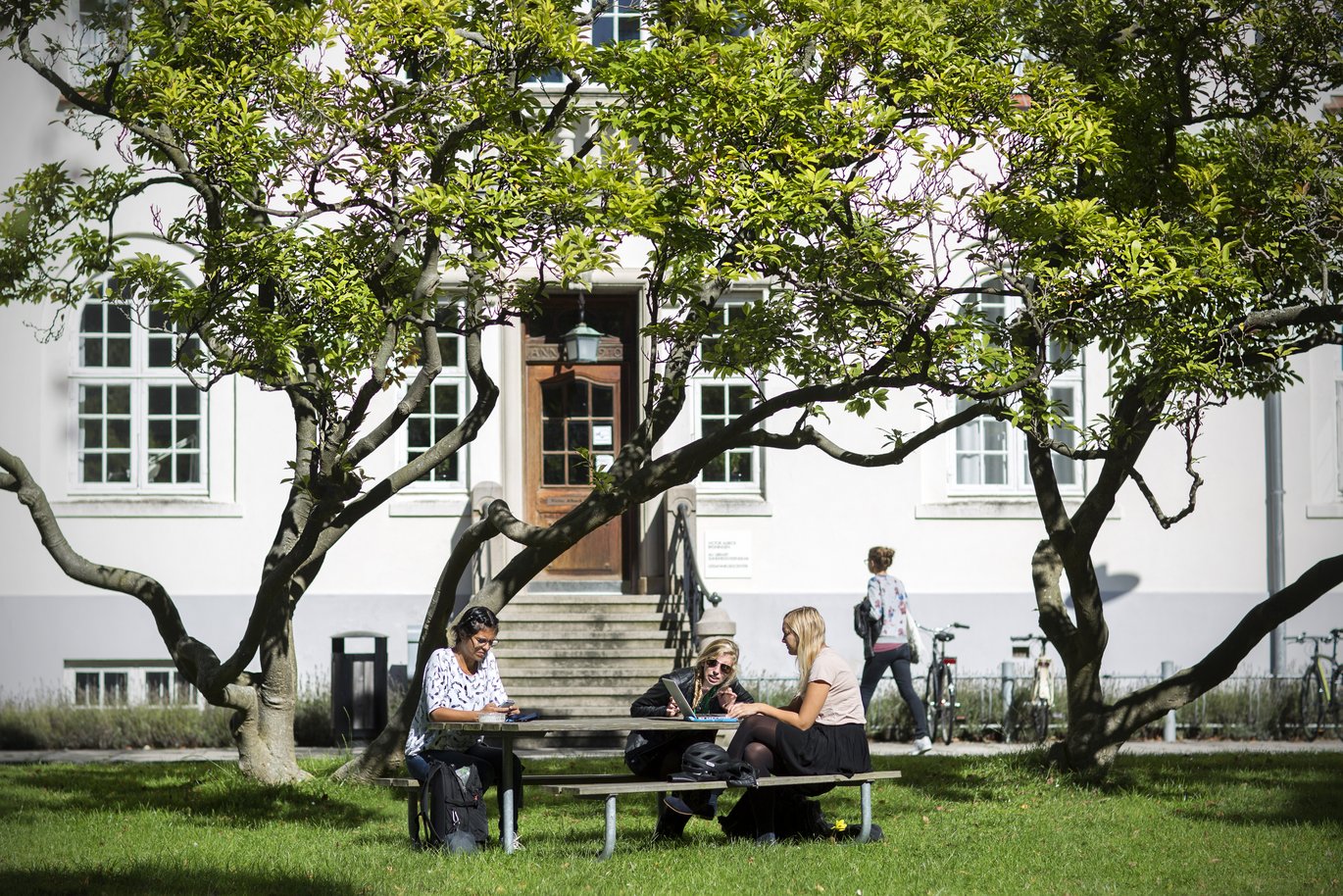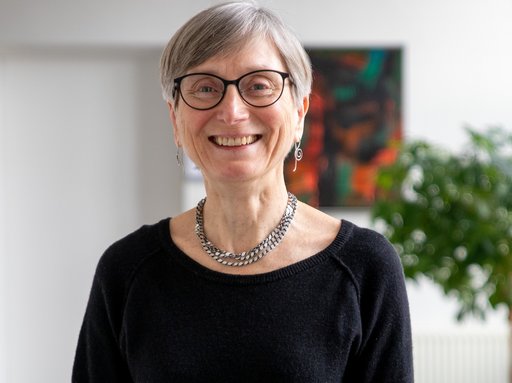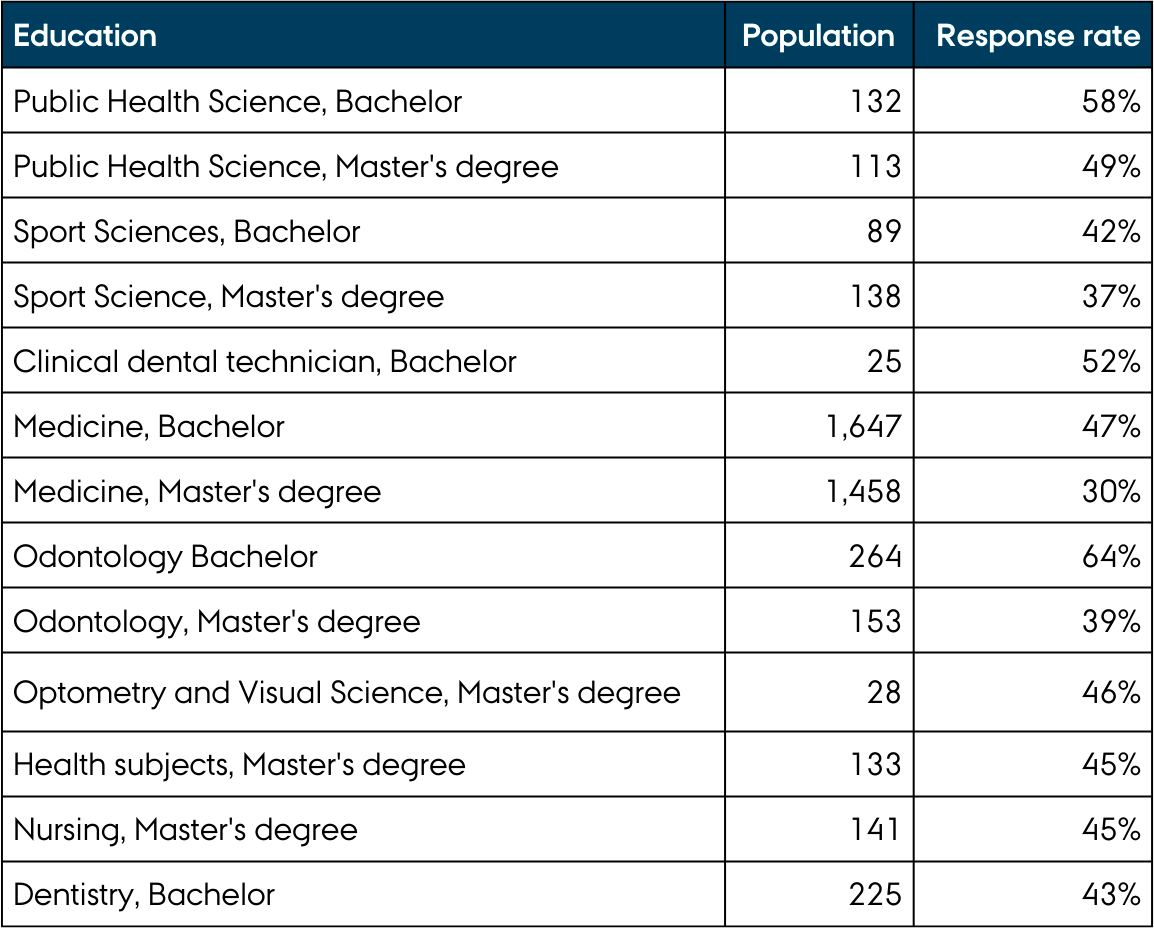Students at Health are (slightly) less stressed
Both the response rate and student satisfaction levels rose a bit in the latest study environment survey. The survey shows that Health's study programmes have a good academic and social environment, but also that student life can feel lonely for some students.


Overall, being a student at Health is great. This is the conclusion of the Danish Study Environment Survey, which every other year takes the temperature of student well-being in Denmark. This year's survey shows that 90 per cent of students at Health believe that the academic level is high, while 85 per cent "agree" or "strongly agree" that the social environment is also good.
Vice Dean of Education at Health Lise Wogensen Bach is also pleased with the results of the survey:
"We’ve had sharp focus on a good study start and a strong and inclusive study environment for all our students. Moreover, we have talented and ambitious teachers and programme directors who offer students a very high level of education. I’m very happy to see this reflected in the survey," she says.
The Danish Study Environment Survey provides insight into how students experience work pressure, whether they are lonely, how much time they spend on their studies and whether they are satisfied with the social and academic environment on their study programmes.
The survey in figures:
- 90 percent of students believe there is a good academic environment at Health.
- 85 percent believe there is a good social environment. Bachelor's students in particular rate the social environment as good (89%), while Master's students generally rate it slightly lower (79%).
- Students generally feel comfortable at Health: 84% agree/strongly agree. (Increase of 6 percentage points on 2021.)
Loneliness
- 12 percent of students on Master's programmes 'often' or 'always' experience loneliness in their studies. (Increase of 1 percentage point.)
- 9 percent of students on Bachelor’s programmes 'often' or 'always' experience loneliness in their studies. (A decrease of 5 percentage points and below the 13 per cent at the overall AU level.)
- BA Sports Science is significantly lower with only 2 per cent who 'often' feel lonely on the programme.
Stress:
- 14 percent of Health students 'often' or 'always' experience strong stress symptoms related to their studies in their daily lives.
- Stress levels are generally higher among women (17%) than men (8%).
Undergraduate students mainly feel pressured by:
- Thoughts about whether they will succeed in their programme:
- (BA Medicine (55%), BA Public Health (55%) and BA Dentistry (54%).
- Own expectations for performance on the programme: (BA Dentistry (70%), BA Public Health (56%), BA Medicine (54%), BA Dentistry (62%), BA Clinical Dental Technology (85%).
Students on Master's programmes mainly feel pressured by:
- Thoughts about what to do after graduation: MSc Public Health Sciences (65%) and MSc Sports Science (65%).
- Practical issues on my programme (rules and regulations, schedule, flexibility, lack of information, etc.) MA Odontology (83%).
Students' time spent on their programme:
- The average student at Health spends 39.1 hours a week on their study programme.
- Students in BA and MSc Odontology and BA and MSc Medicine spend the most time on their study programme.
Stress and loneliness still a concern
Previous studies have shown that students at Health can feel stressed, both generally during their study programme and up to the more busy and intense exam periods. And the new figures show that 14 per cent of Health students still find student life stressful "often" or "always". However, this is actually the lowest level since 2018. In the last survey in 2021, the figure was 17 percent. For undergraduates, stress stems largely from uncertainty about whether they can succeed in their programme and from their own expectations of how well they should perform. On the other hand, the future prospects after graduation weigh heavily for graduates in Public Health and Sports Science and Sports Science, for example.
Some students also feel lonely on their programmes. But loneliness seems partly to depend on how far they are in their studies. 12 per cent of students on Master's programmes experience student life as lonely: a slight increase of one percentage point. There are indications that social life is better in the Bachelor's programmes. Only 9 per cent indicate that they "often" or "always" feel lonely, which is a decrease of five percentage points from previous surveys.
It is probably not realistic to completely eliminate stress and loneliness among students, says Vice Dean Lise Wogensen Bach, who instead emphasises the increasing wellbeing and the many offers the university has for students:
"Of course, we strive to ensure that all our students have a good time throughout their studies and educational journey at Health. But we also know that stress and loneliness will affect many of us throughout our lives. That's why we go to great lengths to inform students about what we can offer at the university. This includes student counselling, the opportunity to talk to a priest and the student counselling service, and we have set up an Academic Environment Council where the pro-rector, programme managers, teachers and students work together to create a good study environment," says Lise Wogensen Bach.
The Danish Study Environment Survey is published by the Danish Agency for Higher Education and Science. The results of the survey will be discussed regularly at status meetings and will be followed up with concrete measures if needed. Read more about the survey and results here.
Strong joint effort boosted the response rate
Every effort was made to increase a response rate that had been sluggish in previous years, and it paid off. Many thanks to staff and students for their efforts. Health had the highest response rate at AU. Overall, 42 per cent of Health's students responded to the survey, which is 10 per cent more than in previous years.
"The survey is a very important indicator of how our students are thriving here at Health, and we use the data to develop and implement new concrete initiatives. So it was important to increase the response rate, and I would like to say a huge thank you to both staff and students for their tremendous effort in doing so" says Lise Wogensen Bach.

Contact
Vice-Dean of Education, Lise Wogensen Bach
Health, Aarhus University
Phone: +4525488522
Mail: lwb@au.dk